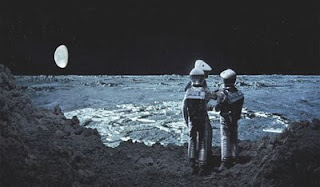Athena says:
"A recent entry by Mike Treder at the IEET site (Institute of Ethics and Emerging Technologies) discusses the Singularity in connection with the upcoming Singularity Summit organized by the SIAI (Singularity Institute for Artificial Intelligence)... I examined the roster of speakers. All are white men. For several, their sole relevant qualification is that they believe in the imminence of the Singularity... Then one of the speakers [note: she is referring to yours truly, but I am not a speaker at the Summit] chimed in, to let me know that “the gender war was a thing of the eighties”. It got even funnier after that, as more Freudian slips showed underneath the space suit of what passes for original progressive thinking."
As a professional and respected biologist, Athena is certainly qualified to speak at such events. But she does not seem too interested: "...the participation of a bona-fide biologist in such an event would be the equivalent of an astrophysicist attending an astrologers’ convention.". It is not pleasant to see this unnecessary insult against a group of very bright persons. Yes, men are also persons, even when they are white.
Then In the comment thread, Athena says:
"as I can tell, the entire transhumanist movement has no truly qualified biologist as a member [sic], nor does it want to — it cramps their style!... As naive as you can be — probably because most transhumanists who aren’t “theorists” work in some aspect of computer systems."
OK, now I am annoyed. Before reading on, please note that I agree with the facts noted by Athena, and with the non-polemic part of her assessment: Yes, there are not enough women and minorities in transhumanist circles. Yes, there are not enough biologists in transhumanist circles. Yes, there should be more.
But the general tone reminds me of the old feminist
I am here to tell you that women can be stupid assholes just like men can be stupid assholes, I have known many stupid assholes of both genders just like I have known many great persons of both genders, and I haven't noticed any significant statistical difference yet. I am here to speak with the often forgotten, unPC voice of common sense and I am, or at least I try to be, both gender-blind and color-blind: I listen and pay attention to all those who have something interesting to say, regardless of the color of their skin or the set of genitals they have. This is common sense.
Like many transhumanists (Athena is right in this respect) I was trained as a theoretical physicist and a computer scientist. And it is certainly true that computer people are sort of biased: they are used to thing of data and applications that can be moved from one computational substrate to another and still remain "themselves" in a given computational context (reference to mind uploading). So it is not surprising that many computer experts tend to take ideas like mind uploading, copying consciousness from a biological brain to other hardware, seriously.
But, aren't biologists biased too? It seems reasonable to think that everyone is biased by their own experience and expertise. Also, everyone tends to consider what they do as the most important thing in the world, so it is not surprising that many biologists have a cold reaction to transhumanism upon hearing that our goals include transcending biology and leaving it behind.
There is, I think, a misunderstanding arising from the perception of computing systems as switches and metal wires, like the computers of the 60s. But the definitions of computer systems used by modern computer people are much more general. For example, a biological brain is a computer in the sense that it is a physical system which obeys the laws of physics, performs a well defined computational activity (my brain is computing me) and is, in principle, understandable, reverse-engineerable and improvable. Our knowledge of brain science is not complete and detailed enough to reverse engineer the brain, improve it and read its full content, but it will be someday, perhaps even soon. And future computing systems may well include biological components. Stefano argues on the Cosmic Engineers list: "an embryo and a uterus might well be the most efficient computer to calculate a mammal from its DNA. But what about convergence? "Computers" need not be about metal wires and silicon. They are switching to carbon anyway. Thus, an "artificial" intelligence may well end up being more "organic" than we expected it to be in the fifties.".
So, biologists, don't be scared, the future needs you and will need you even after the Singularity (if such a thing happens). Come join the transhumanist party.
PS same for women.


